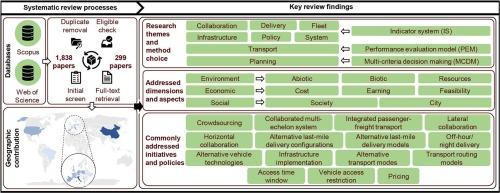Review of sustainability assessments in city logistics from holistic perspective: critical insights, gaps, and future directions
IF 3.8
Q2 TRANSPORTATION
Transportation Research Interdisciplinary Perspectives
Pub Date : 2025-09-01
DOI:10.1016/j.trip.2025.101603
引用次数: 0
Abstract
The existing reviews of sustainability assessments in city logistics are limited in terms of research applications and assessment methods being considered. Comprehensive review from holistic perspective is crucial and missing. This research aimed to offer comprehensive and critical research insight, identify gaps, and propose future directions by analyzing and synthesizing the complete research spectrum of city logistics sustainability assessment. Systematic literature review with iterative approach was applied and 299 articles from Scopus and Web of Science databases were selected and reviewed through content analysis. Results revealed that “transport” and “collaboration” were the most addressed research themes whereas “infrastructure” was the least investigated. Regarding the method practices, findings indicated the prevalence of “indicator system” method group in almost all research themes, except “transport” and “planning” in which “performance evaluation model” and “multi-criteria decision-making” method groups were preferred. As for sustainability coverage, “abiotic”, “resource”, “cost”, and “society” related aspects of sustainability were commonly addressed among studies whereas “biotic”, “earning”, and “city” related aspects were often neglected. In terms of indicator selection, results pointed out the heterogeneity and lack of consensus among studies under current research practices. Through in-depth review analysis, this study proposed comprehensive indicator framework for researchers to provide guidance on future indicator selection processes, offered critical literature insight into existing city logistics sustainability initiatives and their effects on city logistics sustainability for policy makers to consider trade-offs among various initiatives for better decision-making processes, and identified gaps and the way forwards to assist researchers for further advancing the research domain.

从整体角度回顾城市物流的可持续性评估:关键见解、差距和未来方向
现有的城市物流可持续发展评价综述在研究应用和评价方法方面存在局限性。从整体角度进行全面审查是至关重要的,也是缺失的。本研究旨在通过分析和综合城市物流可持续性评估的完整研究光谱,提供全面和批判性的研究见解,找出差距,并提出未来的发展方向。采用迭代法进行系统文献综述,从Scopus和Web of Science数据库中选取299篇文献进行内容分析。结果显示,“交通”和“合作”是最受关注的研究主题,而“基础设施”被调查的最少。在方法实践方面,研究结果表明,“指标体系”方法组在几乎所有研究主题中都普遍存在,但“交通”和“规划”两个主题中更倾向于“绩效评价模型”和“多准则决策”方法组。关于可持续性的覆盖范围,研究通常涉及可持续性的“非生物”、“资源”、“成本”和“社会”相关方面,而“生物”、“收入”和“城市”相关方面往往被忽视。在指标选择方面,研究结果指出,在目前的研究实践下,各研究之间存在异质性,缺乏共识。通过深入的回顾分析,本研究提出了综合指标框架,为研究人员提供了未来指标选择过程的指导,为政策制定者提供了对现有城市物流可持续发展举措及其对城市物流可持续发展影响的批判性文献见解,以考虑各种举措之间的权衡,从而更好地制定决策过程。并确定了差距和前进的方向,以帮助研究人员进一步推进研究领域。
本文章由计算机程序翻译,如有差异,请以英文原文为准。
求助全文
约1分钟内获得全文
求助全文
来源期刊

Transportation Research Interdisciplinary Perspectives
Engineering-Automotive Engineering
CiteScore
12.90
自引率
0.00%
发文量
185
审稿时长
22 weeks
 求助内容:
求助内容: 应助结果提醒方式:
应助结果提醒方式:


